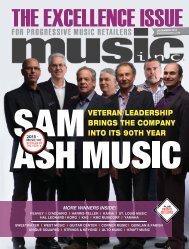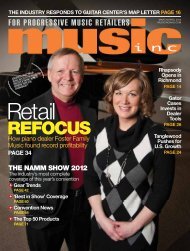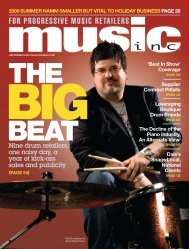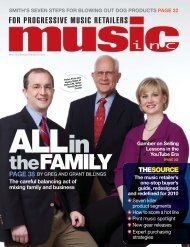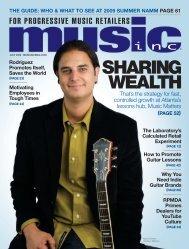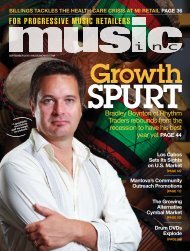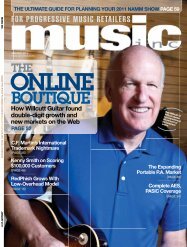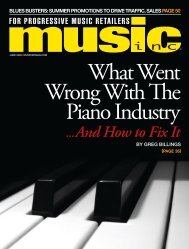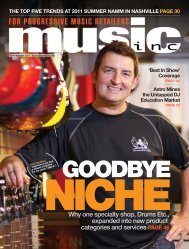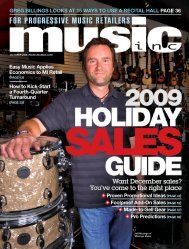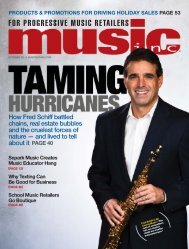Create successful ePaper yourself
Turn your PDF publications into a flip-book with our unique Google optimized e-Paper software.
LESSONS LEARNED I BY GERSON ROSENBLOOM<br />
Tough Decisions<br />
Some decisions make themselves. When you run out of your bestselling<br />
guitar strings, you’ll likely order more. When Elton John<br />
comes to town and wants to stop by your store to try some<br />
pianos, chances are you’ll accommodate him. When your<br />
accountant suddenly announces he’s tripling his retainer, you’ll<br />
probably hustle to shop for a new one. If all decisions in business were this<br />
easy, everyone would be in business.<br />
But easy decisions are a rarity. Instead, most decisions are<br />
riddled with several shades of gray. And once in a while, some<br />
decisions are so tough that they damn near paralyze us.<br />
I dare say that the majority of my decisions as a music<br />
retailer were not clear-cut. Ironically, as I got older and more<br />
experienced in the business, the number of really tough decisions<br />
seemed to grow. I believe this was due to an increasingly<br />
challenging business climate combined with my own awareness<br />
of the consequences of wrong decisions.<br />
The following are a few of my really difficult decisions,<br />
how I handled them and, as always, some lessons learned in<br />
the process.<br />
THREE NEAR-PARALYZING DECISIONS<br />
Many years ago, exclusivity was far more prominent in the<br />
combo business. At the height of the synthesizer explosion,<br />
customers considered my company the go-to store for hightech<br />
products, and we enjoyed<br />
exclusive arrangements on many<br />
key lines. In reality, we and the<br />
manufacturers needed it that way<br />
in order to show the lines in their<br />
best light. But then the keyboard<br />
market weakened, and suppliers<br />
started to look for additional distribution.<br />
I was forced to either allow<br />
this change or open another branch<br />
to satisfy my vendors.<br />
In hindsight, opening the new<br />
branch was a miserable choice. It momentarily doused the fire that was<br />
being fed by the winds of change. But in the long haul, with the weakening<br />
keyboard market, the inevitable happened, and more dealers were opened.<br />
The next decision, which took place in the not-so-distant past, involved<br />
a particular vendor that started forcing its dealers into large buy-ins every<br />
year. The difficulty in the decision was based on my perception that the<br />
line was indispensable to my company’s reputation. I believed that without<br />
this product I wouldn’t be viewed as a serious player. So I ignored the fact<br />
The common thread<br />
behind most bad<br />
decisions retailers make<br />
46 I MUSIC INC. I OCTOBER 2010<br />
that I’d never turn my inventory<br />
quickly enough to justify<br />
the investment and acquiesced<br />
to the company’s demands<br />
several times before realizing<br />
that enough was enough.<br />
The final botched decision<br />
involved my banking relationship.<br />
I’d had a wonderful local<br />
banker for the past quarter century.<br />
Countless millions of dollars<br />
passed through the account.<br />
I had been warned that everything<br />
changes when you<br />
announce that you’re closing<br />
your business, but I trusted that<br />
this particular relationship<br />
transcended the normal pitfalls.<br />
Despite excellent plans for an<br />
orderly dissolution of my company,<br />
let’s just say the bank had<br />
an itchy trigger finger.<br />
WHAT WENT WRONG?<br />
The common thread in all<br />
these decisions is that I<br />
failed to focus, first and foremost,<br />
on my own company.<br />
I made a decision to benefit<br />
my vendors. I made a decision<br />
based on perceived customer<br />
reactions. And I made a decision<br />
based on an honored relationship.<br />
In each case, the right<br />
decision would’ve been the<br />
decision that had the most positive<br />
effect on company profitability.<br />
The bottom line is the<br />
bottom line — and everything<br />
else is just noise. MI<br />
Gerson Rosenbloom is managing director of<br />
Wechter Guitars. He’s former president of<br />
Medley <strong>Music</strong> and a past NAMM chairman.<br />
E-mail him at gersonmusicinc@gmail.com.



